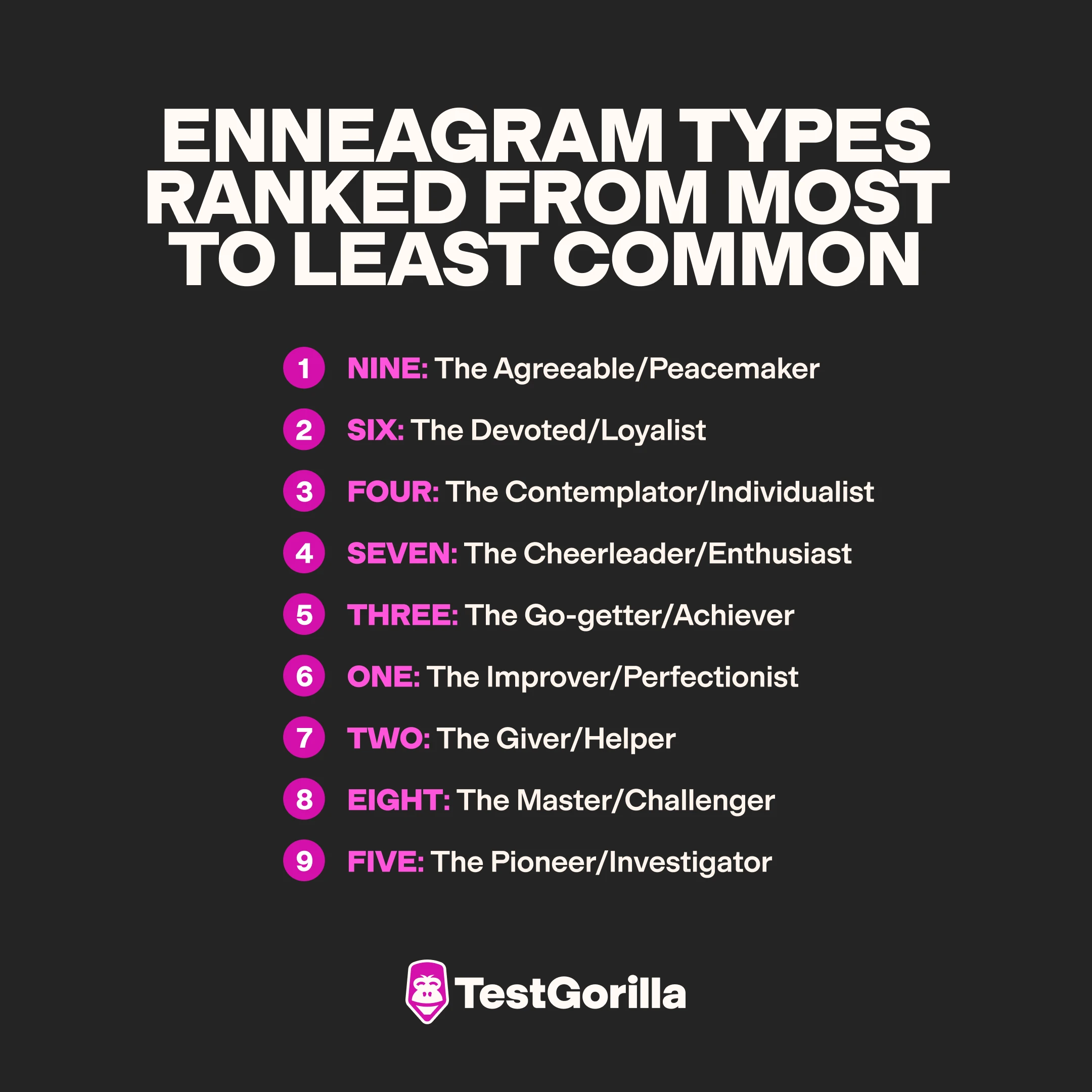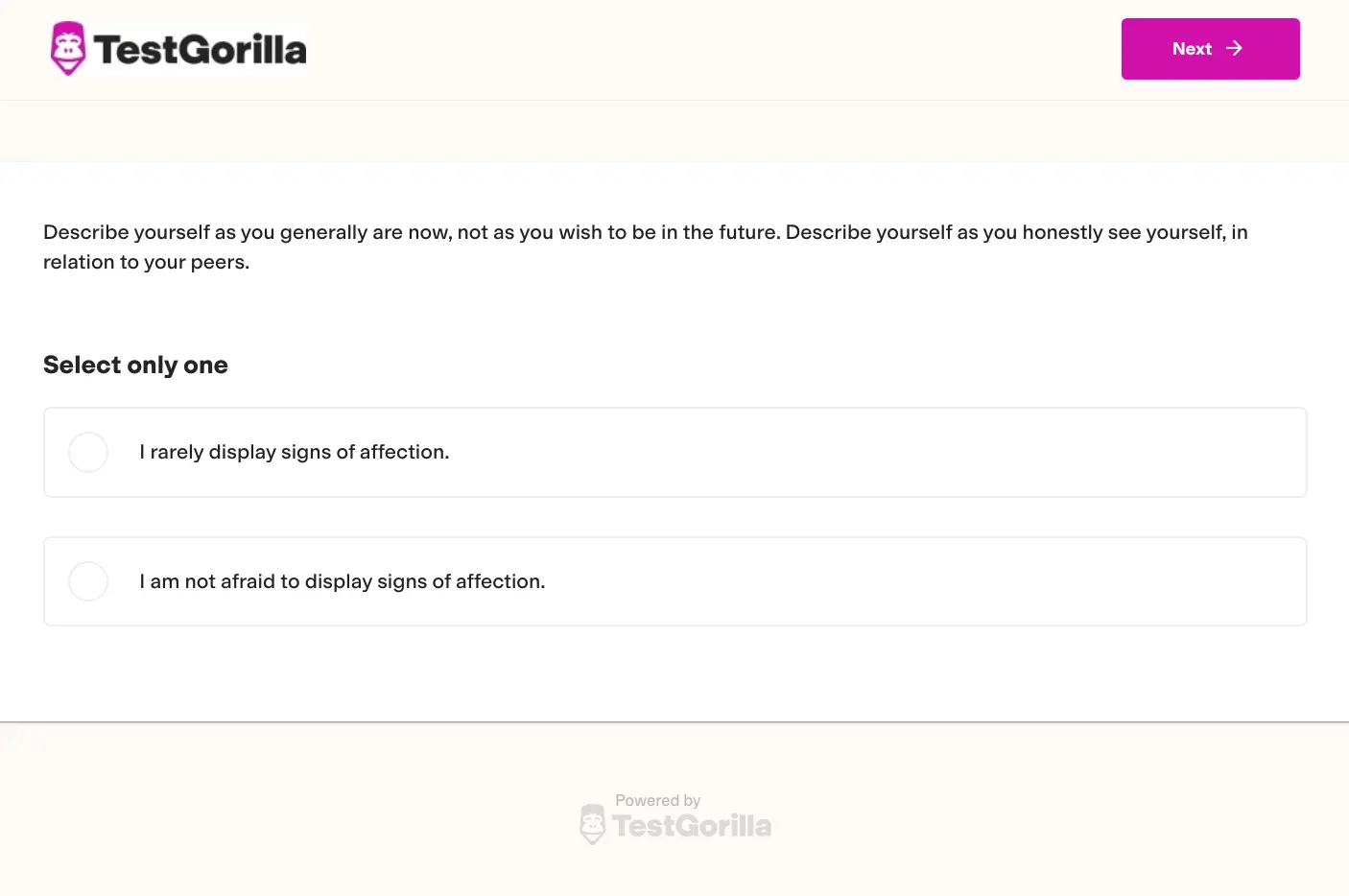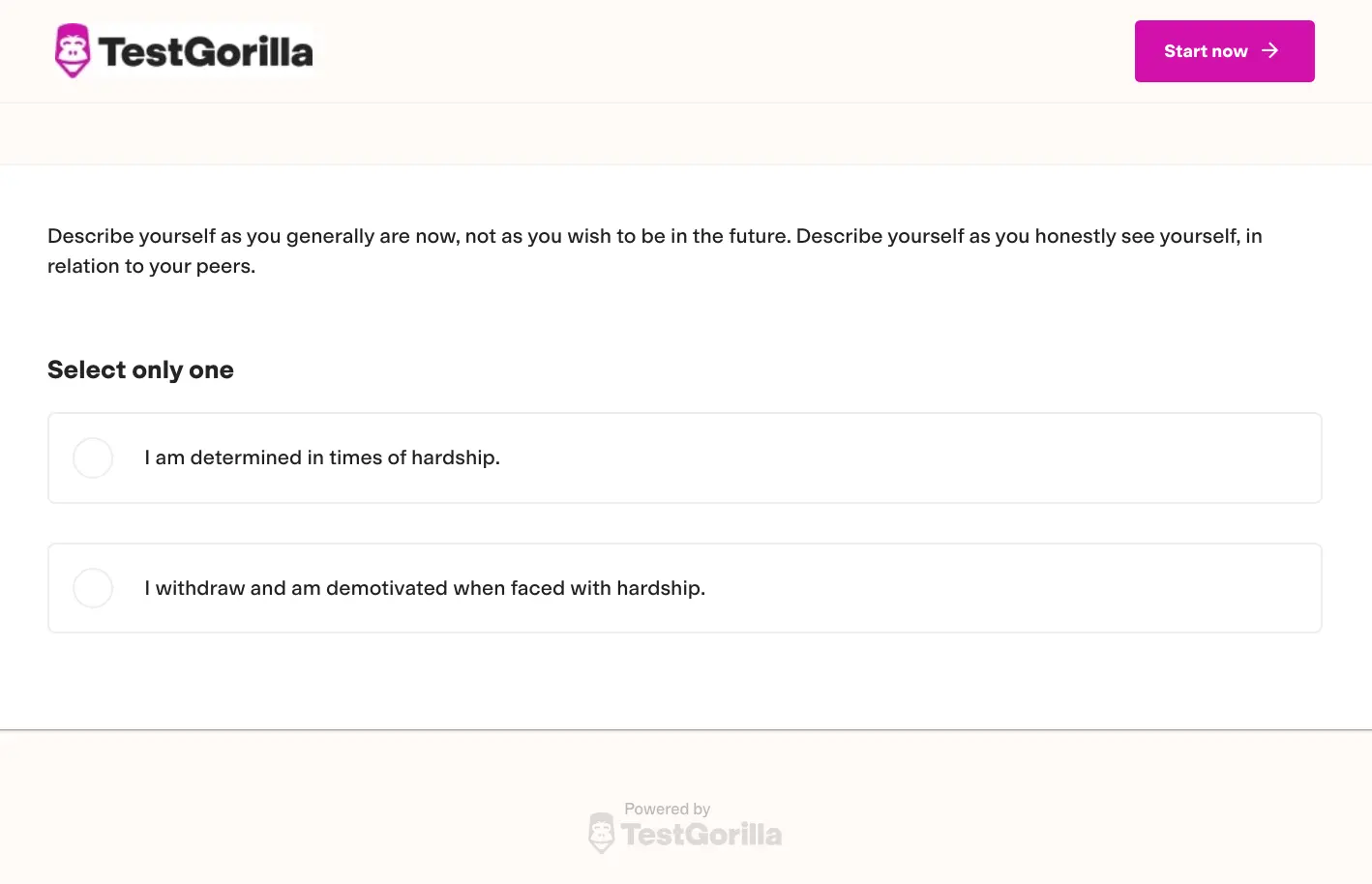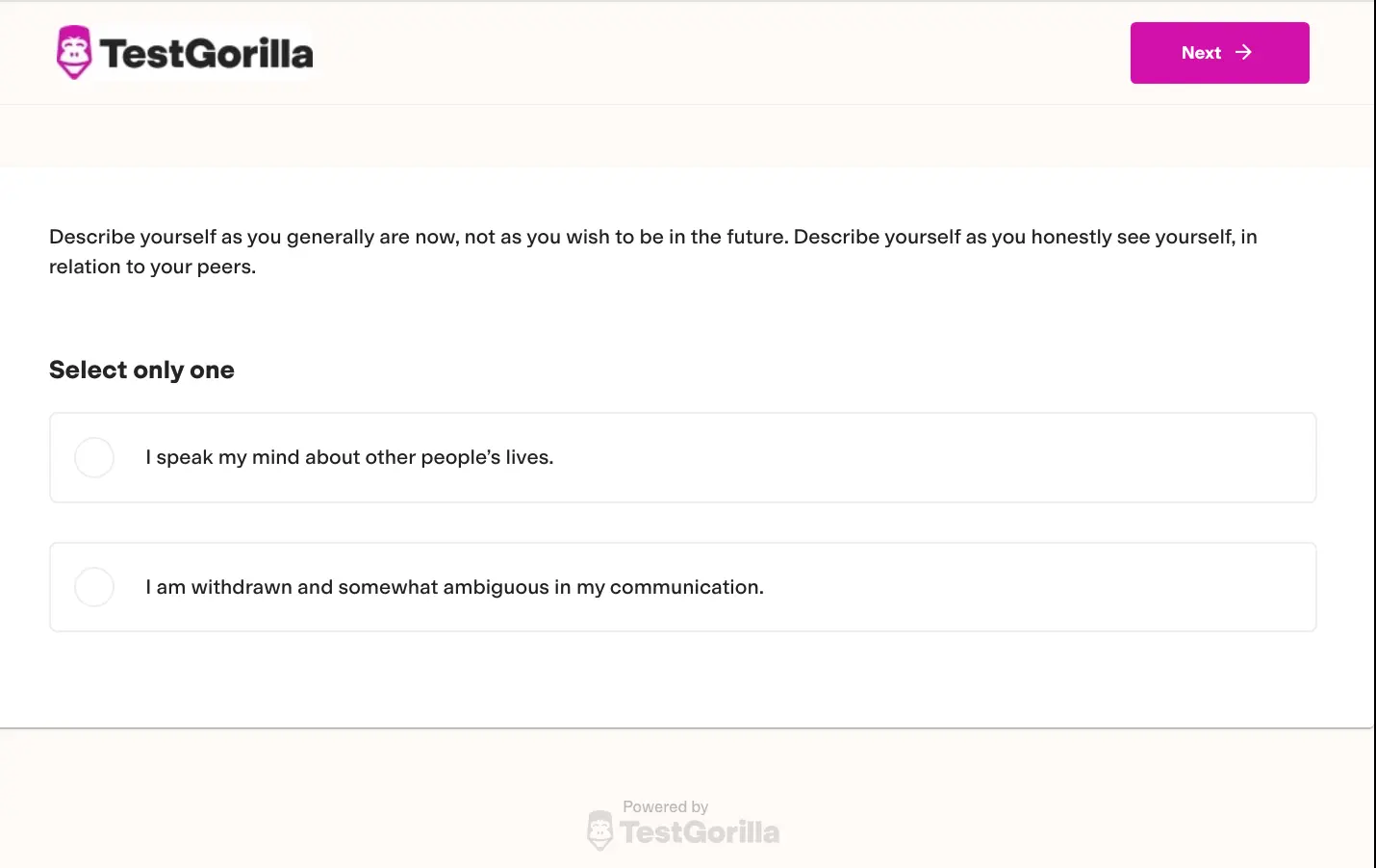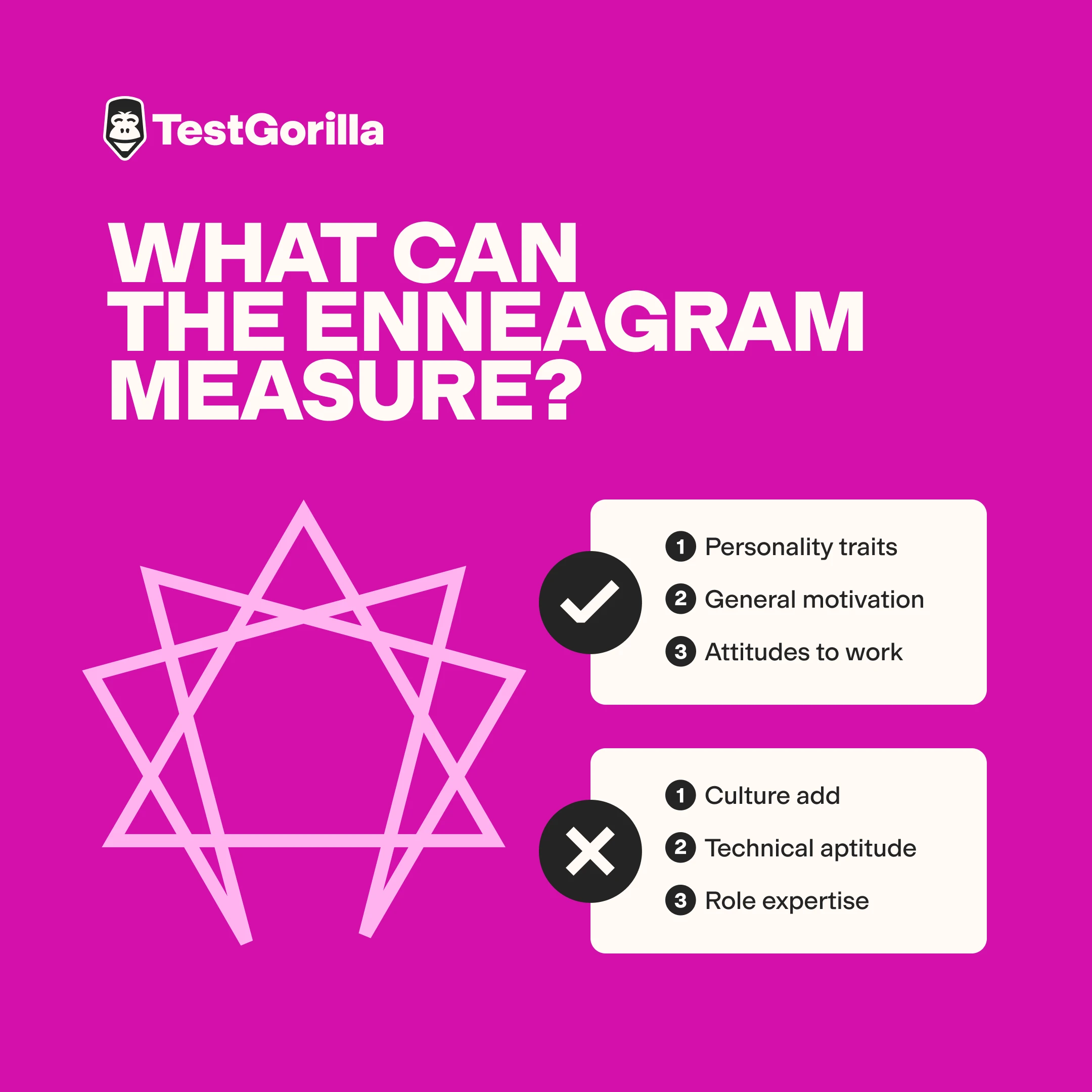Get to know your candidates with TestGorilla personality and skills tests
Choosing the best candidate is difficult if you don’t look beyond hard skills. After all, resumes and interviews rarely reveal an applicant’s motivations.
To account for this screening gap, many recruiters use Enneagram personality typing alongside skills testing. The Enneagram test splits people into nine categories based on their strengths, weaknesses, fears, and motivations.
Understanding the most common Enneagram types helps you match people to appropriate roles, tailor in-depth interview questions, and understand how to support your people better.
To help you find the best talent, we listed the most to least common Enneagram types and explained the insights each type offers.
The most common Enneagram types
Many experts believe the nine Enneagram types are evenly distributed across the global population. However, surveys show some types are more prevalent than others.
An Enneagram population distribution study found that Type Nine, the Agreeable or Peacemaker, is the most common type.
Type Five, the Pioneer or Investigator, is the rarest.
Here’s the complete list of the different Enneagram types ranked from most to least common:
Type Nine: The Agreeable/Peacemaker
Type Six: The Devoted/Loyalist
Type Four: The Contemplator/Individualist
Type Seven: The Cheerleader/Enthusiast
Type Three: The Go-getter/Achiever
Type One: The Improver/Perfectionist
Type Two: The Giver/Helper
Type Eight: The Master/Challenger
Type Five: The Pioneer/Investigator
If you’re just starting out with skills-based hiring, it’s worth knowing which personality types you’re most likely to interview and how to prioritize talent.
Let’s break down this list.
1. Type 9: The Agreeable/Peacemaker
More than 16% of the 189,957 results assessed in the study were Type Nine. These personalities belong to agreeable employees who consider everyone’s point of view. They value harmony and avoid conflict.
Nines thrive in stable jobs where they are valued. They want to drive positive change, mediate disputes, and support others.
Peacemakers are great arbitrators with excellent listening skills, ideally suited to small group projects – but they’re also highly adaptable.
However, they sometimes struggle with creating structure, becoming too complacent, and ignoring personal needs to avoid conflict.
Key traits | Suitable professional fields |
- Non-judgmental and accepting - Good listeners - Strong collaboration skills - Interpersonal skills | - Counseling - Teaching - Healthcare |
2. Type 6: The Devoted/Loyalist
Devoted types are driven by security, and when provided with supportive working environments and growth opportunities, they’re highly productive and loyal.
TestGorilla’s Enneagram test explores Type Six traits with examples such as the one below from a preview question. Typically, a Six might answer that they’re unafraid to show affection:
Sixes need consistent work environments where they feel secure about the future. What’s more, they sometimes feel demotivated if their peers or bosses ignore them or are unreliable.
However, with the right coaching, they become inspiring, supportive leaders in their own right. Well-adjusted Loyalists care deeply about the people they work with and are passionate about causes that interest them.
Key traits | Suitable professional fields |
- Committed, practical workers - Prepared for any situation - Rule-abiding | - Management - Banking - Legal services |
3. Type 4: The Contemplator/Individualist
Type Fours value creativity and authenticity and want their work to be meaningful.
Well-coached Contemplators are authentic, creative, and flexible workers who thrive on multi-faceted projects.
That said, some people with an Enneagram Type 4 become moody and self-absorbed. They might struggle with failure or blame themselves for mistakes.
However, with careful coaching, Fours become confident, creative project workers.
Key traits | Suitable professional fields |
- Self-introspective - Innovative - Empathetic - Strive to make an impact | - Entertainment - Journalism - Photography - Graphic design |
4. Type 7: The Cheerleader/Enthusiast
Driven by excitement and relentless curiosity, Type Sevens are optimistic, spontaneous, fun-loving idealists.
Traits like these make Cheerleaders fantastic leaders and colleagues. They love to solve problems and genuinely relish challenges.
Sometimes, however, Type Sevens struggle to focus on one task at a time and might repress or ignore problems.
Therefore, it’s always wise to hire Cheerleaders for diverse, flexible roles where they are unlikely to get bored.
Interestingly, research suggests Cheerleaders are among the most likely to voice dissent in a company. They are perhaps the most likely type to offer honest feedback.
Key traits | Suitable professional fields |
- Imaginative - Can intrigue and inspire peers - Great team player | - Anything fast-paced and varied - Aerospace - Tourism - Content creation - Personal training |
Find enthusiastic, talented candidates for any role
With TestGorilla, it’s easy to find and screen energetic Cheerleaders who have the technical and soft skills your roles demand.
5. Type 3: The Go-getter/Achiever
Type Three personalities focus on success and admiration. Regardless of the roles you hire them for, they’re likely to strive for excellence.
Go-getters are usually self-assured, even during complex projects. They tend to be highly charismatic and inspiring, and their attitudes to failure are beneficial in high-pressure environments.
Threes are image-conscious, friendly, and often have packed schedules. However, they crave reassurance, sometimes valuing professional accomplishments over personal needs.
It’s best to hire Type Threes for challenging positions offering recognition and reward.
Key traits | Suitable professional fields |
- Highly driven - Cherish personal achievements - Adaptable - Productive | - Advertising - Event planning - Politics - Legal services |
6. Type 1: The Improver/Perfectionist (also known as “The Reformer”)
Type One employees have high standards and want to do everything perfectly. Healthy Type Ones have perfectionism in perspective, often using their conscientiousness to support others.
The best Improvers know objective right from wrong and, despite their perfectionism, understand errors are inevitable. They are excellent assets in roles that need high attention to detail.
However, since they are always focused on improving, they sometimes become overly critical of themselves or their coworkers.
Type Ones appreciate constructive feedback and clear goal frameworks. That said, they often need help managing stress and are overwhelmed at work.
TestGorilla’s Enneagram test helps you spot Improver traits by asking candidates how they approach strict deadlines and difficult tasks. Alternatively, people who perceive themselves as determined are likely to show Type One behaviors:
It’s easy to explore preview questions like the above with our Free forever plan, or by customizing a free Enneagram test with a trial.
Key traits | Suitable professional fields |
- Dedicated - Rule-follower - Attention to detail - Advisor | - Real estate - Architecture - Accounting |
7. Type 2: The Giver/Helper
Type Twos are empathetic and always willing to lend a hand. They want to be liked and are incredibly giving, often keen to connect with people.
Hiring a Type Two means you’re recruiting a “people person” who is deeply intuitive and dedicated. Many recruiters place them in mentorship or management positions.
However, since Twos frequently put others first, they tend to ignore their own needs and might not set boundaries.
Key traits | Suitable professional fields |
- Helpful - Selfless - Build and nurture relationships | - Non-profit and charity - Hospitality - Patient care |
8. Type 8: The Master/Challenger
Type Eights are assertive leaders who like to take control and make decisions.
You’re hiring a “natural” leader. Type Eights are great in high-pressure situations where deadlines are tight and there’s lots at stake.
However, when things don’t go their way, Eights might become controlling, confrontational, or intimidating.
Recruiters may place Eights in positions where they directly impact decision-making or support and influence others.
In fact, research shows that the Eights are some of the most effective leaders thanks to their confidence, passion, and ability to project authority.
TestGorilla’s Enneagram talent assessment helps you find Master traits by asking candidates whether or not they view themselves as open or withdrawn:
Key traits | Suitable professional fields |
- Great leadership skills - Tackle challenges efficiently - Charismatic | - Management - Journalism - Event planning |
Unlock better hiring insights with an Enneagram test
All our personality tests (including the Enneagram test) are available to use on our free plan - start testing for personality traits today!
9. Type 5: The Pioneer/Investigator
Only 4.8% of the results were Type Five, making it the rarest Enneagram type. Fives are innovators who always want to learn. They are some of the easiest candidates to train and upskill.
People with an Enneagram Type 5 are great in roles where you need innovative support from people who see the bigger picture. Pioneers don’t get bogged down in details, instead offering colleagues rare insights they might have missed.
That said, Fives are reclusive and get demotivated around too many people. They get detached from their emotions, instead focusing on growing their knowledge and expertise.
Recruiters do well hiring Fives for highly technical roles or creative positions.
Key traits | Suitable professional fields |
- Endless curiosity - Knowledge and expertise-focused - Analytical, perceptive, and self-reliant - Values privacy and time alone | - Data analysis - Engineering - Web development - Specialized science |
How accurate are Enneagram tests?
Personality testing isn’t 100% accurate. However, the Enneagram test is backed by research suggesting it’s practically useful when assessing motivations, strengths, and fears.
In fact, further studies suggest it also helps managers and employees develop training plans because it helps people learn more about themselves.
However, the Enneagram test shouldn’t decide final hiring decisions. It should be used with other methods to learn more about your candidate’s personality, motivation, and working methods.
When used as part of a multi-measure assessment, TestGorilla’s Enneagram test helps hiring teams quickly understand a candidate’s personality traits.
Our ten-minute test, developed by subject experts, outlines an applicant’s core beliefs, which indicate how they might react to different scenarios.
What’s more, unlike some free Enneagram test providers, we ensure our test is easy to customize for various recruitment needs.
We’ve supported scores of companies with personality tests to help enhance their hiring decision-making. Take IDP Education, for example.
By introducing personality tests before the interview stage, IDPE cut down hiring time and resources frequently wasted on the wrong candidates.
If you’re concerned about the time you’re wasting hiring the wrong people, check out our recruitment ROI calculator to see how TestGorilla can help.
Get to know your candidates better with TestGorilla's Enneagram test
The best insights on HR and recruitment, delivered to your inbox.
Biweekly updates. No spam. Unsubscribe any time.
TestGorilla: How Enneagram personality tests help recruiters hire smarter
Understanding a candidate’s personality type is always important in making effective hiring decisions.
However, just because the Peacemaker is the most common Enneagram type doesn’t mean you should assume most candidates fall into this category.
Thankfully, you don’t have to be an Enneagram expert to find this information out. Simply use TestGorilla’s in-depth Enneagram test and other job-specific skills tests to find the best candidates.
Ready to see our Enneagram test and our skills discovery platform in action?
Book a free demo with our team for a hands-on preview whenever you’re ready, or sign up for a free 15-day trial (if you have more than 50 full-time employees) to explore on your own.
Most common enneagram type FAQs
Let’s close our guide with a few final commonly asked questions.
Can someone’s Enneagram test results change over time?
According to Enneagram theory, a person’s Enneagram type doesn’t change. It’s a permanent part of your personality that is formed at an early age based on your upbringing and socialization. Although behavior may vary in different situations, a person’s core motivations are likely to remain the same.
What are the common life paths or trajectories of the most common Enneagram type?
Type Nines, or Peacemakers, are most likely to follow career paths in healthcare, counseling, and education. They are excellent listeners and mediators who collaborate well with others. Peacemakers thrive in roles and situations where they care for and support others and make objective decisions. They excel as teachers, nurses, and therapists.
What are the common misconceptions about the most common Enneagram type?
They’re poor leaders and struggle to resolve conflict
They struggle to get things done on time
They have difficulty focusing on tasks and the bigger picture
They’re slow to react and sometimes drag projects out unnecessarily
They are lazy and lack proactivity, falling behind others
They’re always prone to procrastination
Does Enneagram correlate with MBTI?
Yes, the Enneagram types correlate with the Myers-Briggs Type Indicator (MBTI).
For example, most judging types (ENJJ, ESTJ, ENTJ, ESFJ, INFJ, INTJ, ISFJ, ENFJ, or ISTJ), whether introverts or extroverts, correlate with Enneagram 1. Feeling types (ENFP, ESFP, INFP, or ISFP) correlate with Enneagram 2. Thinking types (ENTP, ESTP, INTP, or ISTP) and most extroverts correlate with Enneagram 3.
There are also more detailed correlations between each MBTI type and Enneagram type we can’t go into depth here. You can read more about them here.
Related posts
You've scrolled this far
Why not try TestGorilla for free, and see what happens when you put skills first.



